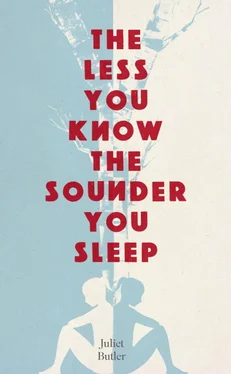As the years went by, the general term ‘defective’ was replaced by ‘invalid’, a word which was broken down into other official categorizations, such as moron, imbecile and cretin, uneducable and educable, or walking and non-walking. Everyone else was just ‘healthy’. Yet Soviet propaganda tarred all those who were disabled with the brush of being profoundly and incurably flawed and inadequate.
In 2006, Vladimir Putin declared his wish that all abandoned children should be placed in families rather than institutions. However, around 340,000 Russian children with disabilities are still being kept in orphanages for ‘Uneducables’ and isolated. If they survive, they are usually transferred to mental institutions for adults or Old People’s Homes. Nearly 30 per cent of all children with disabilities in Russia still live in State care, yet 95 per cent of them have at least one living parent. The proportion of disabled children in orphanages is four times higher than in Western countries.
Services in Russia for children with disabilities very much reflect attitudes established during the Soviet era. Parents are still encouraged to leave their children to institutional care and sign forms ‘rejecting’ those that are most seriously handicapped. Recently, more families have ignored this advice, but mothers report facing general hostility from society when opting to take care of their children instead of placing them in a government facility. Stigma and shame concerning disability are still prevalent in Russian society and so adoption of these children among Russians is very rare within the country. In 2012, President Putin approved a bill that prohibits Russian children from being adopted by American citizens. A spokesman said that the rationale behind this was that Americans adopt children to get extra welfare benefits and ‘then begin to hate this child’. Sixty thousand Russian children have been adopted by American families over the past twenty years – by far the biggest proportion of any other country – and the vast majority of them are leading happy, supported lives within loving families.
Dissertation published in 1959 by T. T. Alexeyeva: Neurohumoral regulation of functions in the human body (research on inseparable twins)
Introduction
For many years P. K. Anokhin and his colleagues have been carrying out experiments in the Institute of Experimental Medicine to establish the separate roles of the nervous system and the blood system on the body’s ability to adjust to conditions such as prolonged sleep deprivation, extreme hunger and extreme temperature change. The research for this work was carried out on a pair of un-separated twins Masha–Dasha (ischiopagus b. 1950).
The resolution of these problems in normal experimental conditions on a single organism is an impossible task. However, un-separated twins occur in nature both among animals and among humans and are a unique object for research as their nervous system is usually completely separate and yet their blood is shared.
They can be used to establish the independent roles of the nervous system and the blood system and thus are objects of great interest as a remarkable human experiment created by nature.
From the first days of their lives the twins were kept in laboratory conditions. It was also important to study their behavioural development. It was noted that, despite living in an identical environment, developmental characteristics such as speech, movement and nervous processes were markedly different from birth.
Blood System
To study the speed with which the blood travelled from one twin to the other we introduced various substances into the blood of one child, such as radioactive iodine, barium, glucose and sodium methane sulphonate. For example, 2,500 units of radioactive iodine were introduced into Masha after which the levels of radioactivity in the thyroid of both twins were measured with a Geiger counter… The kidneys were observed when sodium methane sulphonate was introduced into the ulnar vein of one child. In thirty minutes a distinct change in the contours of the kidneys of both children were observed on X-rays.
Nervous System
By the age of two months their faces began to differ. Their reaction to pain (usually introduced by a scalpel, a needle or an electric shock) differed markedly. On being given a bottle of boiling hot milk, for example, Dasha cries out, pushes her scalded hands under her pillow and refuses to touch it again, but Masha repeatedly takes the bottle and then pushes it away crying out.
At the age of six months the twins cry on seeing any instrument of pain and by nine months they cry on seeing the person who conducts the tests on pain sensitivity (T. T. Alexeyeva). Tests to establish the boundary of the nervous system in each twin were therefore carried out when they were asleep or unawares. Tests to establish discrete conditioned reflex to pain involved administering an electric shock to coincide with the ticking of a metronome. By the age of six months the ticking alone resulted in Masha crying out in fear and Dasha recoiling in anticipation of the shock.
Blood samples are taken three times a day. Dasha recoils from the needle and must be held down, but Masha no longer reacts by crying and bears the insertion quietly.
Sleep
We assessed the depth of their sleep by waking one of them with abrupt stimuli such as a sharp pain or a loud noise in one ear. Despite the wailing of one twin, the other would continue to sleep unless awoken by flailing limbs. As part of our sleep experiments, we kept one or other of the twins awake artificially for long periods. For example, we would constantly stimulate one twin preventing it from falling asleep. Or we would feed one twin and not the other so the fasting twin stayed awake through hunger pangs. In the first year of their lives they were normally fed every three hours, but on keeping one of them fasting for up to nine hours the rhythms of sleep were successfully reversed.
At all times during experiments the heartbeats were recorded by electrocardiograms (ECG), their breathing was recorded by pneumograms (PNG), their brain activity by an electroencephalogram (EEG) and their gastric juices were analysed through tubes fed into their stomachs. Experiments were carried out concurrently.
Thermo-regulation
Since any physical or chemical changes pass from one child to the other within two minutes, the twins represent a remarkable opportunity to examine the role of thermo-regulation through measuring the temperature of the blood. The temperature of one child was lowered for example by packing ice into six thin-walled brass cylinders and placing them on the stomach, spine and flank of one child. It took two and half minutes for the temperature of this child to fall from a normal 37 degrees down to 26 degrees. When the canisters were removed, however, it took an average of fifteen minutes for normal temperature to be restored.
Hunger
In order to prove or disprove the theory of ‘satiated’ or ‘hungry’ blood, the twins were fed under separate regimes whereby one twin missed up to three feeds. The gastric juices of both twins were evaluated by tubes inserted directly into the stomach through the mouth. The hungry child would continue to cry until fed even if this was for a nine-hour period, disproving the theory that blood containing nutrients can satisfy the hunger of the organism. Analysis of gastric juices was undertaken when the hungry child was shown the other child being fed and also when it was isolated from its twin by a board. As babies, when the hungry twin was given an empty bottle to suck, it too produced gastric juices indicating a cortical conditioned reflex to secrete gastric juices in the expectation of food. Irritants were introduced into their stomach via a surgically inserted probe to measure the relative acidity of their gastric juices.
Читать дальше
Конец ознакомительного отрывка
Купить книгу












